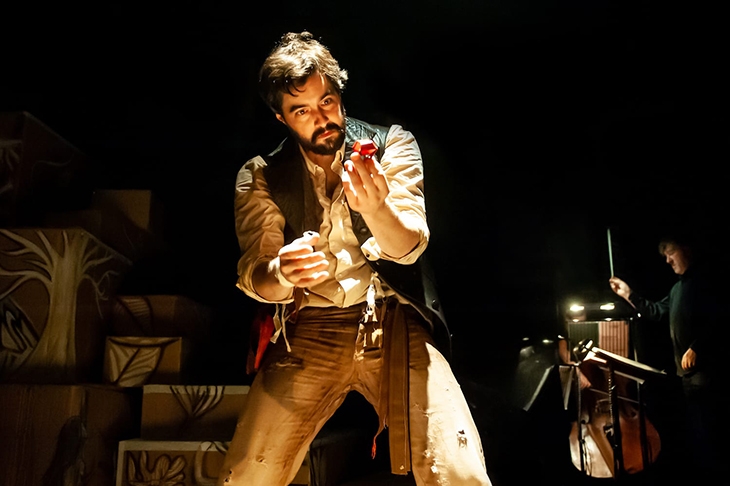When it comes to the opening of Wagner’s Das Rheingold, Mark Twain probably put it as well as anyone: ‘Out of darkness and distance and mystery soft rich notes rose upon the stillness, and from his grave the dead magician began to weave his spells about his disciples and steep their souls in his enchantments.’ As at Bayreuth, so in Dalston. At the start of Julia Burbach’s production for Grimeborn, a man stumbles into a back alley and, rummaging through discarded boxes, finds a pair of headphones. And there it is: that deep, eternal E flat. Don’t some people say they can hear an all-pervading global hum? Wagner’s world is turning, and for good or for evil the old sorcerer is weaving his spell again.
Staging any part of the Ring cycle in the handkerchief-sized Arcola Theatre might sound like a stretch, but Wagner handles the hard bit, and even in Jonathan Dove’s reduced 18-piece orchestration (conducted with quiet command by Peter Selwyn), he can move universes with the shift of a harmony. Burbach and her designer Bettina John take care of the rest. The idea of Alberich as a man on the run from reality, pulled into a fantastic and brutal alternative world, is beguiling. Burbach uses Dove’s numerous cuts and omissions to shape a counter-intuitive vision of Wagner’s world, in which Alberich’s (Seth Carico) mental-health issues (it’s never clear whether his Nibelung slaves are anything more than a set of toy action figures) are a matter for more genuine sympathy than the gods’ household squabbles. A family of espresso-sipping gentrifiers, Burbach’s deities are led by a Wotan (Paul Carey Jones), whose bronzed nobility of tone is undercut by his lust for the Ring, and whose treatment of Alberich, in league with Philip Sheffield’s rasping, red-trousered Loge, is shockingly brutal.
Anyway, this all happens just inches away from you, with absolutely no vocal or dramatic compromise. Wagnerian voices of the power and eloquence of Gareth Brynmor John (Donner) and Andrew Tipple (a desperately touching Fasolt) give this domestic drama an overwhelming ferocity. Only Longborough offers Wagner that invades your personal space quite this thrillingly, and even there you wouldn’t quite manage to see Marianne Vidal’s glamourpuss Fricka quietly hyperventilating, or the play of fear and shame on Freia’s (Kiandra Howarth) face as her menfolk load her into another cardboard box. As in all the best Rheingolds, Carico’s Alberich is a vocal match for Wotan, and it’s hard to damn any character as wholly malign when the pain in their eyes is so visible.
It’s as bracing a take on Rheingold as you’ll see; a provocative and intelligent attempt to engage with the piece as an independent drama, and magnificently sung. Dove eliminates altogether the character of Mime, Alberich’s brutalised victim. This, and only this, makes a sympathetic Alberich credible, and the drama ends with him wretched and alone, having been worked over by a bunch of particularly hateful yuppies. Fair enough, if the story is to go no further. But Wagner is planning on going further. This isn’t Brecht: music and words are dense with intimations of future complexity, good as well as evil, before the inevitable end. Still, why bother with Wagner at all, unless his floodtide of emotion carries the mind into unexpected and troubling places? I suspect the Master would have acknowledged (though not endorsed) both the seriousness and the effrontery of this counterfactual Rheingold.
Gustavo Dudamel and the Los Angeles Philharmonic descended on Edinburgh with a performance of Tchaikovsky’s Fourth Symphony that was so gorgeously played, and so breathlessly, ardently lyrical that a British listener, with their eyes closed and the standard set of prejudices (and prejudices about Dudamel are as entrenched as they come), would have sworn they were listening to one of the so-called ‘Big Five’ orchestras from the other side of the USA. As for John Adams’s new piano concerto Must the Devil have All the Good Tunes? — well, over three linked movements Adams does his usual thing: a deftly orchestrated urban nocturne, peppered with references to mid-century pop culture.
Yuja Wang rode Adams’s chugging solo part with diamond-toothed swagger, before getting down to real business with three encores. Tea for Two melted in the mouth. Strauss’s Tritsch-Tratsch-Polka swirled glittering starbursts of tone at the edge both of sonority and of physical possibility. Tchaikovsky’s Danse des petits cygnes tiptoed through the air and dissolved with a throwaway shrug. This must be how audiences felt when they heard Liszt: you just sat there, hand on mouth, trying not to giggle with delight at the sheer marvel of it all. Imagine how compelling it might have been if Adams had written a concerto that really embodied Wang’s prowess and personality. But this is classical music: the only branch of showbusiness where ‘crowd-pleasing’ is a pejorative term.






Comments